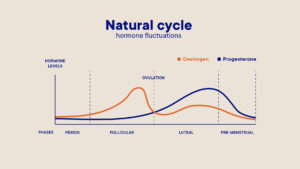Do you have a question about sexual health? Submit your own question to our Sexpert!
Disclaimer: I am not a medical professional, and it is always best to talk with your primary care provider if you are concerned about your health. To make an appointment with your primary care provider at UHS, call (585) 275-2662.
Submission: Is sex drive affected by the menstrual cycle, i.e. higher sex drives at certain point and little to no desire at others?
Sex drive is a very fluid thing for most likely everyone. You may find that lots of things affect your sex drive, including how well rested you are, the state of your mental health, drugs or alcohol, exercise, medication, and more! With that being said, you are on the right track with questioning what effect the menstrual cycle has on sex drive.

During the various phases of the menstrual cycle, your body produces different hormones, such as estrogen (spelled oestrogen in the graph above) and progesterone at different levels. With this can come a fluctuation in sex drive for some. While each person is different, many people experience a higher sex drive during ovulation, or right at the end of the follicular phase, when estrogen is at its highest. One commonly found explanation for the increase in sex drive is the body’s biological desire to reproduce. You are most fertile during ovulation, so the increase in sex drive could be an evolutionary response intended to increase chance of reproduction. In addition to estrogen spiking during this time, oxytocin is also at its highest. Oxytocin is often referred to as the love hormone, and can aid in sexual arousal, trust, and romantic attachment. And on top of these two hormones, your body also produces luteinizing hormone, which is what triggers ovulation. One, or some combination of these hormones is likely what causes increased sex drive during ovulation. However, there is not a ton of concrete data or research out there.
Following ovulation, progesterone is at its highest, which is also when many folks notice a sharp decrease in sexual desire. Again, we don’t know that this is necessarily the reason why many people see a decrease in sex drive, but this could certainly be the case. In addition to hormone levels, symptoms that some folks experience in the pre-menstrual phase can lead to a decrease in sex drive. These might include low mood, anxiety, and fatigue – all things that logically might make someone less interested in sex.
As mentioned, everyone will have different experiences with changes in sex drive related to the menstrual cycle. If you are interested in discovering more about your own sex drive and menstrual cycle, you may wish to start tracking your cycle along with your sex drive. You can do this the old-fashioned way with pen and paper, or by using an app to track your period. There are lots out there, and you can weigh the pros and cons of each for your own needs.
Reference: Jennis Blog Post — Does your menstrual cycle affect your sex drive?
